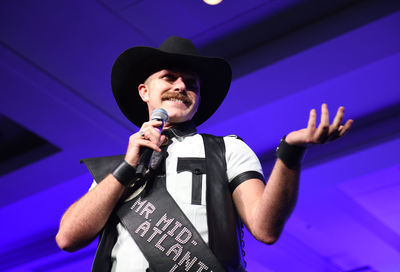Federal Judge: “There Are Two Sexes: Male And Female”
Judge Danny Reeves ruled that the U.S. Department of Education, which issued Title IX guidance for schools, overstepped its authority.

A federal judge issued a ruling blocking the Biden administration’s guidance for schools, under which LGBTQ students discriminated against because of their sexual orientation or gender identity can file complaints of sex discrimination.
U.S. District Court Judge Danny Reeves opened his 93-page opinion with the declaration, “There are two sexes: male and female.”
The Biden administration’s Title IX guidance expands the definition of “sex” beyond just a person’s biological anatomy.
The guidance is meant to protect LGBTQ students from incidents of unequal treatment, harassment, or sex stereotyping, which are usually based, in part, on a person’s assigned sex at birth and how they present, in terms of gender norms, to the outside world.
The guidance also aligns with federal court rulings — including a 2020 Supreme Court decision — finding that discrimination based on a person’s sexual orientation or gender identity is inherently a form of sex-based discrimination.
Reeves, of the Eastern District of Kentucky, ruled that the U.S. Department of Education, which issued the new guidance, had overstepped its authority by defining “sex” as including gender identity, reports The New York Times.
As a result, the guidance — set to take effect on August 1 — cannot be enforced in the states of Kentucky, Tennessee, Ohio, Indiana, Virginia, and West Virginia, which were all parties to the lawsuit.
The ruling comes just after federal judges in Texas and Louisiana, in separate opinions, blocked the Title IX guidance from being enforced.
The Louisiana case also applied to the states of Mississippi, Montana, and Idaho, which joined as parties to that lawsuit.
In sum, 22 states with Republican attorneys general — egged on by conservative and Christian advocacy groups — have filed at least 10 separate lawsuits seeking to prohibit schools from enacting pro-transgender policies.
The policies would allow transgender students to access restrooms and changing rooms that match their gender identity, be referred to by names and pronouns that match their gender identity, and amend their school records and transcripts, among other rights.
Writing for the court, Reeves rejected the Education Department’s central rationale: that the Supreme Court’s finding in the case of Bostock v. Clayton County — which dealt with whether LGBTQ people were protected from workplace discrimination by Title VII of the Civil Rights Act — justified extending similar, but not identical, sex-discrimination protections to LGBTQ students under Title IX.
“At bottom, the Department would turn Title IX on its head by redefining ‘sex’ to include ‘gender identity.’ But ‘sex’ and ‘gender identity’ do not mean the same thing,” Reeves wrote. “The Department’s interpretation conflicts with the plain language of Title IX and therefore exceeds its authority to promulgate regulations under that statute.”
Reeves argued that separating students based on sex on sports teams and in restrooms and changing facilities was integral to ensuring that women are guaranteed equal opportunities and access to resources, as dictated by Title IX.
He also claimed that schools that failed to conform to the Biden administration’s interpretation of Title IX risked losing federal funding and might suffer “irreparable harm” as a result.
Reeves contended that the rules could violate the First Amendment rights of teachers or students who deny the existence of gender identity and refuse to use pronouns or names that affirm a transgender person’s gender identity.
“It is unclear how the Government’s articulated position can be seen as anything less than a tacit endorsement of a content-based heckler’s veto,” he wrote. “So long as the offended individuals complain with sufficient vigor, the refusal to abide by preferred pronouns can be deemed harassment and exposes a recipient of Federal funds to liability under Title IX….
“The Department’s Final Rule forces the Nation’s schools and educators to convey a message ordained in Washington, D.C., while silencing dissenting opinions and undermining state law and the discretion of local school boards. … Under the Final Rule, these teachers will be silenced.”
Reeves argues that the Education Department failed to account for how the Title IX guidance will impact the constitutional right of parents to influence their child’s education, pointing to hypothetical situations in which a student’s desire to use names or pronouns that differ from those on their official school record conflict with a parent’s desire not to affirm their child’s purported gender identity.
“Although the Final Rule gestures at retaining a certain role for parents, it does not provide that parental opposition to their child’s selective gender identity requires schools to exempt that student from Title IX’s new mandate,” Reeves wrote. “To the contrary, it implies that Title IX could supersede parental preferences about a child’s treatment depending on the case.”
Lastly, Reeves argues that not maintaining spaces segregated based on a person’s assigned sex at birth undermines the very spirit of Title IX, and infringes on the bodily privacy of students who would be forced to share multi-user facilities with transgender students.
“[D]espite society’s enduring recognition of biological differences between the sexes, as well as an individual’s basic right to bodily privacy, the Final Rule mandates that schools permit biological men into women’s intimate spaces, and women into men’s, within the educational environment based entirely on a person’s subjective gender identity,” he wrote. “This result is not only impossible to square with Title IX but with the broader guarantee of education protection for all students.
“Ultimately, the Department’s failure to provide any concrete, contradictory data to the concerns raised by the States, parents, and educators renders it difficult to fathom how it determined that ‘the benefits’ of the new regulations ‘far outweigh [their] estimated costs.'”
Support Metro Weekly’s Journalism
These are challenging times for news organizations. And yet it’s crucial we stay active and provide vital resources and information to both our local readers and the world. So won’t you please take a moment and consider supporting Metro Weekly with a membership? For as little as $5 a month, you can help ensure Metro Weekly magazine and MetroWeekly.com remain free, viable resources as we provide the best, most diverse, culturally-resonant LGBTQ coverage in both the D.C. region and around the world. Memberships come with exclusive perks and discounts, your own personal digital delivery of each week’s magazine (and an archive), access to our Member's Lounge when it launches this fall, and exclusive members-only items like Metro Weekly Membership Mugs and Tote Bags! Check out all our membership levels here and please join us today!



























You must be logged in to post a comment.